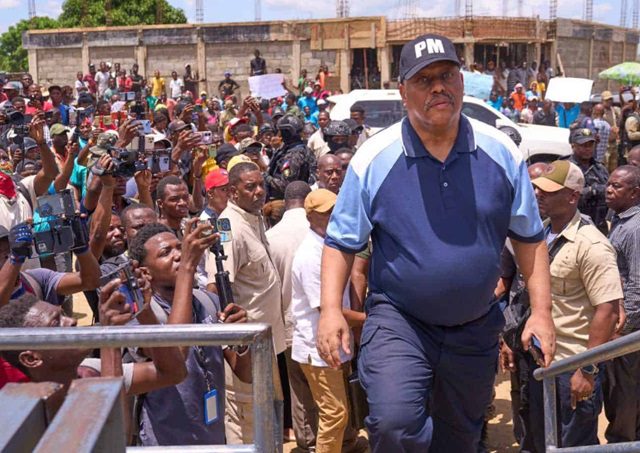BTN News: Haitian Prime Minister Garry Conille made a significant visit to the northern region of Haiti on Friday, particularly to the Juana Méndez canal on the Masacre River, which forms part of the contentious border with the Dominican Republic. This visit comes amidst ongoing tensions between the two nations, sparked by the Dominican Republic’s strong opposition to the canal’s construction, which they deem “illegal” and a violation of international agreements. Conille’s trip to this sensitive area underscores the Haitian government’s focus on addressing the socio-economic challenges and security concerns in the northern departments of Haiti, while also attempting to ease diplomatic strains with their neighbor to the east.
Prime Minister Conille’s visit was more than just a routine inspection; it was an effort to engage directly with local authorities, assess the current infrastructure, and understand the region’s potential for economic and tourism development. Arriving in the bustling city of Juana Méndez, Conille was accompanied by a substantial delegation, including government officials and members of the diplomatic corps. The presence of such a large entourage highlighted the importance of this mission. The streets of the city were crowded with residents eager to witness the visit and capture the moment, reflecting the high stakes and public interest in the issues at hand.
In his remarks, Conille emphasized the importance of the northern region to Haiti’s broader development strategy, noting that “the north is a priority for integrated and global development.” He highlighted the government’s commitment to working collaboratively with local stakeholders to address the socio-economic and security challenges facing the region. This visit also included a stop at the Codevi industrial park, a key economic hub in the area, where Conille met with its leadership and participated in a symbolic tree planting with the park’s president, Fernando Capellán. While the details of their discussions remain undisclosed, this gesture underscored the government’s interest in fostering sustainable development in the region.
Throughout his visit, Conille toured several critical institutions and infrastructures in the northern zone, including the Justinien hospital and the José Martí power plant. These visits were part of a broader agenda to evaluate the current state of essential services and explore opportunities for further development. Additionally, Conille held meetings with representatives from the National Airport Authority (AAN) and the National Civil Aviation Office (Ofnac) to discuss the future of migration and transportation infrastructure in the north, which are crucial for the region’s economic integration and growth.
As part of this northern tour, Conille and his government team presented the administration’s roadmap on Thursday, outlining their vision and strategy for the region’s development. This presentation was attended by a wide array of diplomats, including representatives and ambassadors from the United States, Canada, France, Spain, Mexico, Chile, Switzerland, the United Nations, and the European Union. The international presence at this event signaled the global community’s keen interest in Haiti’s stability and development, particularly in the context of the ongoing tensions with the Dominican Republic.
The backdrop to this visit is the ongoing conflict over the construction of the canal on the Masacre River, a project that began in 2023 and has been a major point of contention between Haiti and the Dominican Republic. The Dominican government, led by President Luis Abinader, has strongly opposed the canal, arguing that it violates existing treaties and could disrupt the delicate balance of transboundary water resources. In response to the construction, the Dominican Republic temporarily closed its borders with Haiti in September 2023, a move that underscored the seriousness of the dispute. Although the borders have since been reopened, tensions remain high.
President Abinader has made it clear that the canal’s construction is viewed as a provocation, alleging that it is being carried out by private sectors without proper engineering oversight, which could lead to environmental and geopolitical consequences. The Dominican Republic even went so far as to mobilize troops to the border, a stark reminder of the potential for escalation in this conflict. Despite these measures, the construction of the canal has continued, further straining relations between the two countries.
On the other hand, the Haitian government, under the leadership of Ariel Henry, has advocated for what they see as a fair resolution to the conflict. Haiti argues that the only acceptable outcome is an “equitable distribution of transboundary rivers,” which would ensure that both nations have access to the vital water resources shared by the Masacre River. This dispute has been taken to international forums, including the Organization of American States (OAS), as both countries seek to resolve their differences through diplomatic channels.
In parallel to opposing the diversion of the Masacre’s waters, the Dominican government has also initiated the rehabilitation of the La Vigía canal in Dajabón. This move is intended to secure water resources for Dominican farmers on their side of the border, reflecting the broader regional importance of water management in this arid area.
Prime Minister Garry Conille’s visit to the north highlights the Haitian government’s determination to address the complex challenges facing the region, from economic development to diplomatic tensions. As Haiti continues to navigate its relationship with the Dominican Republic, the outcome of these efforts will have significant implications for the stability and prosperity of both nations.


